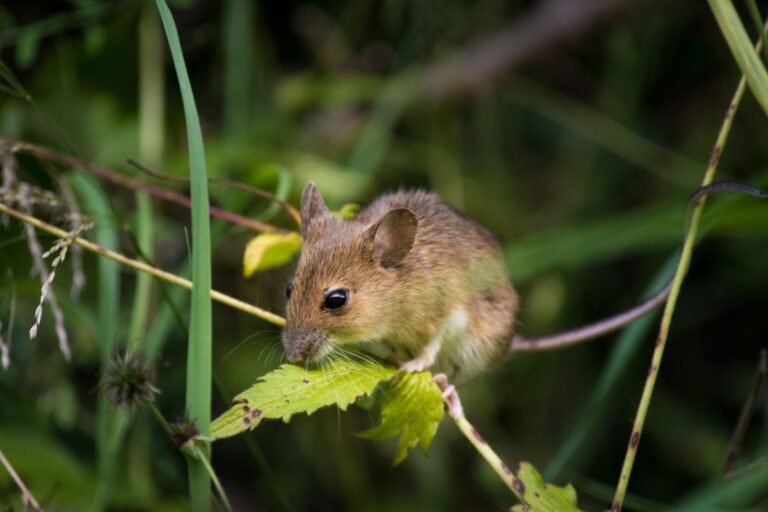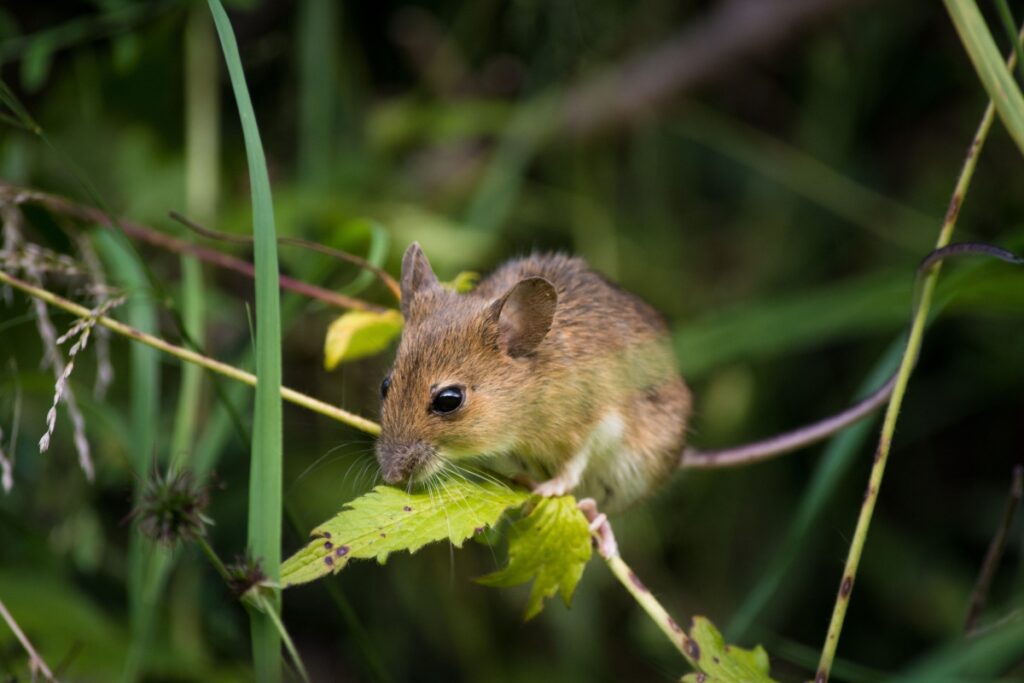Table of Contents
What Are Rodents?
Rodents are a diverse group of mammals characterized by their continuously growing incisors, which they use for gnawing and chewing. In the context of gardens, some common rodents you might encounter include mice, rats, squirrels, and voles. These animals can cause damage to gardens by eating plants, fruits, and seeds, as well as by burrowing underground. They can also be carriers of diseases and parasites, posing potential risks to human and pet health. Managing rodents in the garden often involves strategies such as removing food sources, securing garden structures, and implementing traps or deterrents.
5 Types of Rodents
In gardens, you’re likely to encounter several types of rodents. Here are some common ones:
Mice: There are various species of mice that can inhabit gardens, including house mice and field mice. They are small rodents with pointed snouts, rounded ears, and long tails. Mice are prolific breeders and can quickly become a nuisance in gardens, feeding on plants, seeds, and fruits.
Rats: Both Norway rats and roof rats are common in many areas. Norway rats are larger and stockier, while roof rats are more agile and tend to climb. Rats can cause significant damage to gardens by feeding on a wide range of crops and by burrowing in the soil.
Squirrels: Tree squirrels, such as gray squirrels and red squirrels, are frequently found in gardens, especially those with trees. They are known for their bushy tails, sharp claws, and ability to climb. Squirrels can be attracted to gardens by bird feeders, fruits, nuts, and seeds.
Voles: Also known as meadow mice or field mice, voles are small, stocky rodents with short tails and rounded snouts. They primarily live underground and create extensive tunnel systems. Voles can cause damage to gardens by feeding on roots, bulbs, and the lower parts of plants.
Chipmunks: These small, striped rodents are part of the squirrel family. Chipmunks are known for their burrowing behavior and can be attracted to gardens by bird feeders and fallen seeds. They may feed on bulbs, fruits, and young plants.
Each of these rodents has its own habits, preferences, and potential impact on garden ecosystems. Managing rodent populations in the garden often involves a combination of preventive measures, habitat modification, and, in some cases, humane trapping or deterrent methods.
How to Get Rid of Rodents
Getting rid of rodents in the garden can be challenging, but there are several effective methods you can try. Here are some strategies:
Remove Food Sources: Rodents are attracted to gardens by food sources such as fruits, seeds, and vegetables. Keep your garden area clean and tidy by promptly removing fallen fruits, seeds, and food scraps. Store birdseed and pet food in sealed containers to prevent easy access for rodents.
Seal Entry Points: Inspect your garden for any openings or gaps in fences, walls, or structures where rodents could enter. Seal these entry points with wire mesh, hardware cloth, or caulking to prevent rodents from gaining access to your garden.
Use Traps: Traps can be an effective way to control rodent populations in the garden. Snap traps, live traps, and multi-catch traps are commonly used options. Place traps along rodent runways, near burrow entrances, or in areas where rodents are active. Check traps regularly and dispose of captured rodents humanely.
Natural Predators: Encouraging natural predators of rodents, such as owls, hawks, snakes, and domesticated cats, can help control rodent populations in the garden. Provide habitat for these predators by installing birdhouses, nesting boxes, or perches.
Deterrents: There are various deterrents available that can help repel rodents from the garden. These include ultrasonic repellents, motion-activated sprinklers, and predator scent deterrents. However, effectiveness can vary, so it may require some experimentation to find what works best for your situation.
Remove Shelter: Rodents seek shelter in dense vegetation, mulch piles, compost heaps, and debris piles. Keep these areas well-maintained and clear of clutter to reduce potential hiding spots for rodents.
Chemical Repellents: There are some chemical repellents available that can deter rodents from the garden. These may include repellent sprays or granules containing natural or synthetic ingredients that rodents find unpleasant. Follow the manufacturer’s instructions carefully when using chemical repellents.
Professional Assistance: In severe infestations or if other methods are ineffective, consider seeking assistance from pest control professionals. They can provide specialized solutions tailored to your specific rodent problem.
Remember to approach rodent control in a humane and environmentally responsible manner, considering the potential impact on other wildlife and the ecosystem. Additionally, it’s important to remain persistent and consistent with your rodent control efforts to achieve long-term success.

6 Harmful Effects of Rodents on Plants
Rodents can have several harmful effects on plants in the garden, ranging from direct damage to indirect consequences. Here are some of the main ways rodents can negatively impact plants:
Feeding Damage: Rodents such as mice, rats, and voles feed on various parts of plants, including leaves, stems, roots, bulbs, fruits, and seeds. Their feeding activity can cause significant damage to garden plants, leading to stunted growth, wilting, and even death of the affected plants. Rodents may also girdle tree bark, leading to tree decline or death.
Seed Consumption: Rodents are notorious for consuming seeds, both in the ground and stored above ground. They may dig up newly planted seeds or consume seeds directly from plants, reducing germination rates and inhibiting the growth of desirable plants.
Bulb and Tuber Damage: Many rodents, particularly voles, are known to feed on underground plant parts such as bulbs, tubers, and roots. This can result in the destruction of flower bulbs, vegetable crops, and ornamental plants, causing reduced yields and weakening the overall health of the plants.
Nesting and Burrowing: Rodents create burrows and nesting sites in the soil, which can disrupt plant roots and soil structure. Burrowing activity can cause soil erosion, destabilize garden structures, and lead to the exposure of plant roots, making them more vulnerable to damage from environmental stressors.
Disease Transmission: Rodents can serve as carriers of plant diseases, fungi, and bacteria. Their saliva, feces, and urine may contain pathogens that can infect plants, leading to diseases such as bacterial rots, fungal infections, and viral diseases. Additionally, rodents can transfer pests such as mites and aphids, further exacerbating plant health issues.
Indirect Effects: Rodents can indirectly harm plants by attracting other pests and predators. For example, the presence of rodents may attract predators such as snakes, which can disrupt the garden ecosystem and prey on beneficial wildlife. Additionally, rodents may facilitate the spread of invasive plant species by dispersing seeds through their foraging activities.
Overall, the presence of rodents in the garden can pose significant challenges to plant health and productivity. Implementing effective rodent control measures is essential for minimizing damage and maintaining a healthy garden ecosystem.
FAQs
How do rodents damage plants in the garden? Rodents can damage plants by feeding on leaves, stems, roots, bulbs, fruits, and seeds. They may also dig up newly planted seeds, consume underground plant parts, and create burrows that disrupt soil structure and root systems.
What types of rodents are commonly found in gardens? Common rodents found in gardens include mice, rats, squirrels, voles, and chipmunks. Each of these rodents may have specific behaviors and preferences that affect how they interact with garden plants.
How can I tell if rodents are damaging my plants? Signs of rodent damage on plants may include chewed leaves and stems, missing fruits or seeds, gnaw marks on tree bark, disturbed soil around plant bases, and visible burrow entrances. Keep an eye out for these indicators, especially in areas where rodents are active.
What plants are most vulnerable to rodent damage? Rodents may target a wide range of plants, but some species are particularly vulnerable. Bulb plants, root vegetables, fruit-bearing trees and shrubs, and newly planted seeds are often attractive targets for rodents.
How can I protect my plants from rodent damage? Protecting plants from rodents may involve various strategies, including using physical barriers such as wire mesh or hardware cloth, planting rodent-resistant species, applying repellents, implementing traps, and removing food and shelter sources that attract rodents.
Are there any natural predators of garden rodents? Yes, natural predators of garden rodents include birds of prey such as owls and hawks, snakes, domesticated cats, and some predatory mammals. Encouraging these predators by providing habitat and minimizing human disturbance can help control rodent populations.
Can rodents spread diseases to garden plants? Yes, rodents can spread diseases to garden plants through their saliva, feces, and urine. They may introduce pathogens that cause bacterial rots, fungal diseases, and viral infections, leading to plant decline and reduced yields.
What should I do if I suspect a rodent infestation in my garden? If you suspect a rodent infestation in your garden, take prompt action to address the problem. Implement rodent control measures such as removing food sources, sealing entry points, setting traps, and seeking assistance from pest control professionals if needed.
Share this post:




